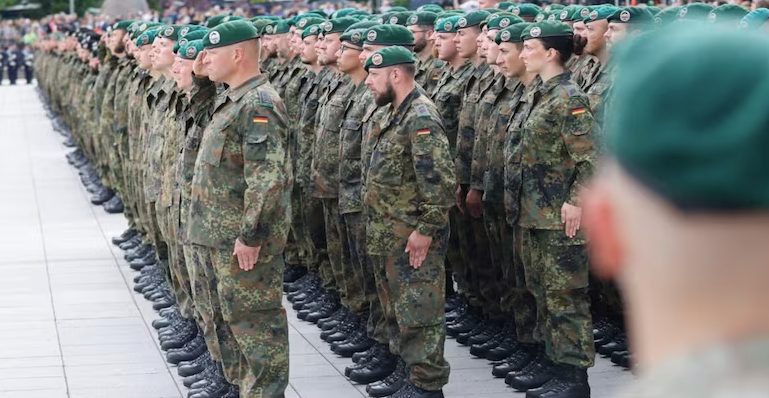In a sudden and unexpected shift from its military stance maintained since the end of World War II, Germany took a major step forward by undertaking its first-ever permanent deployment of foreign troops. The historic step is the deployment of the 45th Armored Brigade to the nation of Lithuania. The significance of the step is colossal as it not only puts emphasis on but also reiterates Germany’s firm determination towards the objectives of NATO and the larger agenda of upholding European security. The step comes especially in the wake of the rising tensions that have been observed since Russia unilaterally commenced an attack on Ukraine in the year 2022.
Historically, the country of Germany has always been extremely reluctant when it comes to foreign deployments of its forces, based primarily on the lasting legacy of World War II. But with the shifting and evolving security environment that is currently being established in Eastern Europe, specifically in relation to the many threats that are currently being seen by the Baltic states, there has been serious encouragement for a serious rethinking of this historical stance. Lithuania, bordering Russia’s Kaliningrad enclave and Belarus, is especially strategically important, particularly in relation to the Suwałki Gap—this thin corridor that essentially links the Baltic states to the rest of the NATO alliance. Control of this strategic area is felt to be absolutely crucial to the preservation of NATO’s operational integrity in the region.
The deployment is synchronized with Germany’s strategic policy called “Zeitenwende,” or “turning point.” The policy has been officially declared by Chancellor Olaf Scholz in 2022. The declaration is a significant and major boost in the country’s defense budget, and a pledge to take a more active military role in the framework of NATO.
45th Armored Brigade: A Review of Its Structure and Strategic Goals
Activated on 1 April 2025, the 45th Armored Brigade, or “Panzerbrigade 45” or “Lithuania Brigade,” is a heavy mechanized brigade of Germany’s 10th Panzer Division. Full operational strength by 2027 will be comprised of approximately 4,800 troops and 200 civilian staff.
The brigades consist of:
- 122nd Mechanized Infantry Battalion of Oberviechtach, Bavaria
- 203rd Tank Battalion of Augustdorf, North Rhine-Westphalia
The Multinational Enhanced Forward Presence, or the eFP, Battlegroup Lithuania will be fully integrated by 2026. The supporting units will consist of a variety of specialized branches like artillery, logistics, reconnaissance, engineering, and signal companies. This will provide the assurance that there are overall operational capabilities to ensure different requirements of missions are fulfilled effectively.
The main objective of this initiative is to significantly enhance and strengthen NATO’s defense in the eastern direction, thus discouraging any potential acts of aggression that may occur. Secondarily, it is also meant to provide a clear assurance to the Baltic allies regarding Germany’s unyielding solidarity towards their security and well-being.
Challenges of Infrastructure and Deployment
The primary operating base for the brigade will be strategically located at the Rūdninkai Training Area, where it will be perfectly suited for such activities, and there will be supplementary facilities in Rukla in order to further enhance their capacity. In a significant move towards improving military readiness and infrastructure, Lithuania is investing around €1.7 billion to construct and develop the required infrastructure that not only includes the accommodations of staff but also large training grounds and a variety of support services needed for effective functioning.
Germany also has cost and logistical problems and places the average cost of deployment at between €6 billion and €9 billion, with an annual operating cost of approximately €800 million. Measures are in place to resolve shortages of manpower and to enhance conditions of service to recruit and retain soldiers for this mission.
This deployment is an important and intriguing move in the defense policy of Germany, which has historically had a minimalist defense posture. This is, however, an initiative toward accepting a more proactive role in the context of the NATO alliance. This deployment is also an important precedent that may pave the way for future potential permanent deployments in other strategic locations across the globe.
The deployment of the 45th Armored Brigade to Lithuania is most likely to have a strong impact on raising the deterrent value against any possible aggressor, thus contributing towards making the collective defense position of the NATO more robust overall. Additionally, the decision is also a strong indication of a broader trend observed across Europe, with states increasing their defense spending and enhancing greater military cooperation in direct response to the changing security challenges that have increasingly been seen over the last few years.
German establishment of the 45th Armored Brigade in Lithuania is a milestone and turning point in the new security dynamics of Europe. Not only does this bold move affirm an unshakeable and impenetrable commitment to the collective defense policy by NATO allies, but it seamlessly feeds into the new security agenda being addressed across the region. In addition, this move unequivocally evidences a more active and participatory role for Germany in the quest for stability across the region.
Keep Reading Questiqa Europe for more such analysis and reports.

More Stories
Why Europe’s Trade Landscape Is Watching India’s Strategic Tariff Concessions
How the UK-India Free Trade Agreement Could Reshape Chemical Exports and Manufacturing in Europe
Why Europe Is Watching India’s Trade Negotiations Closely Amid US Pressure